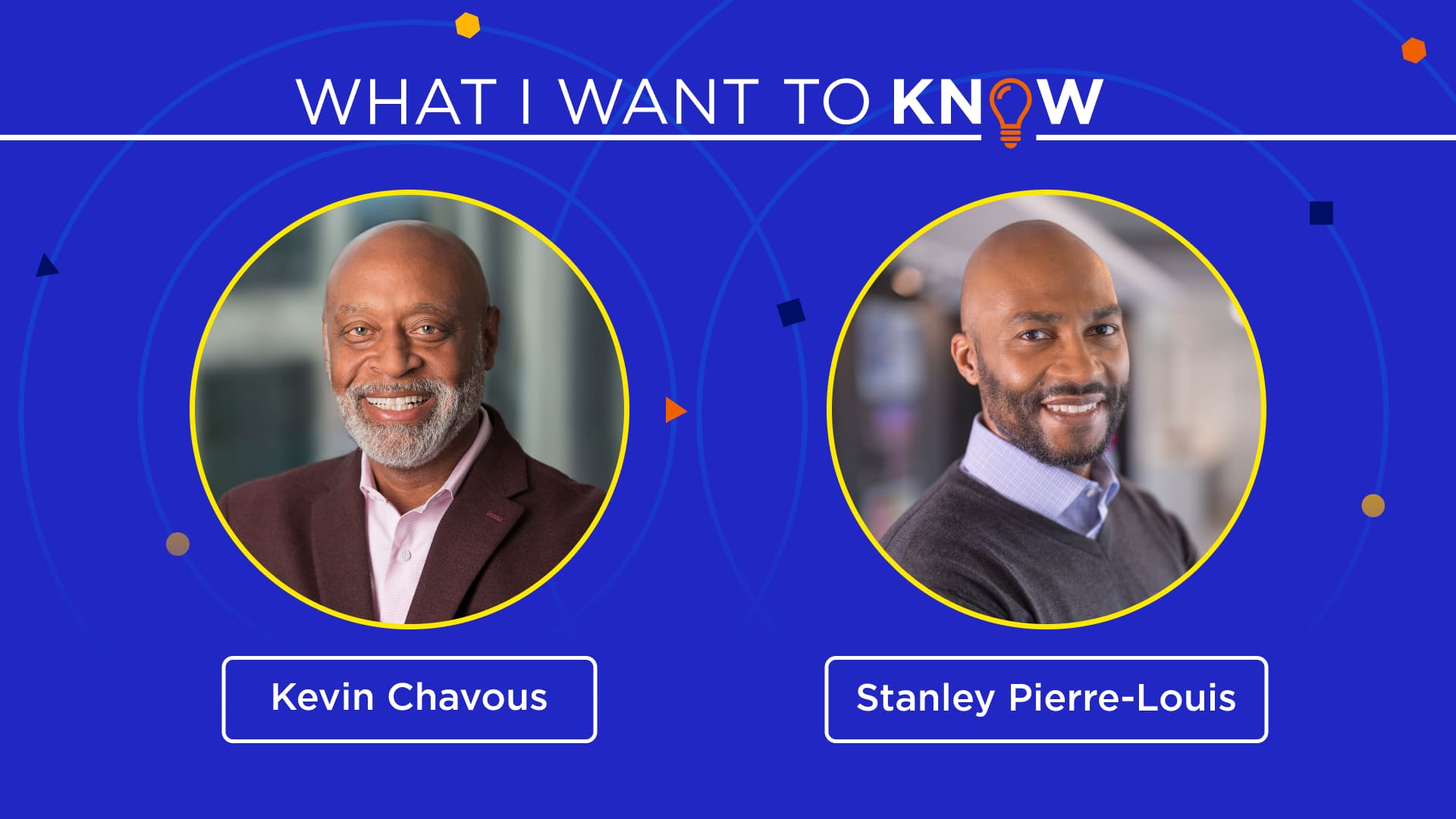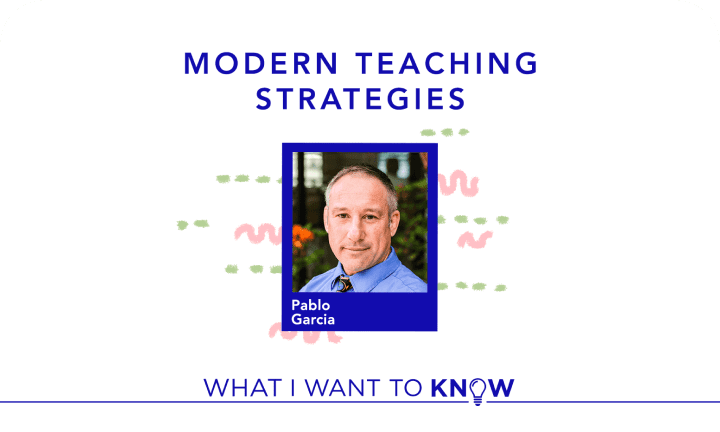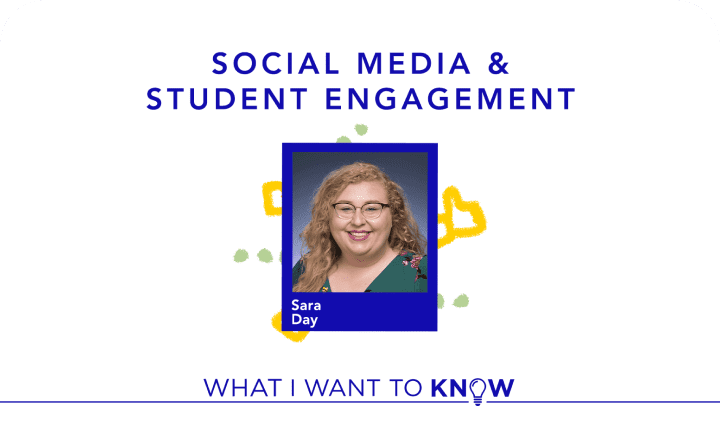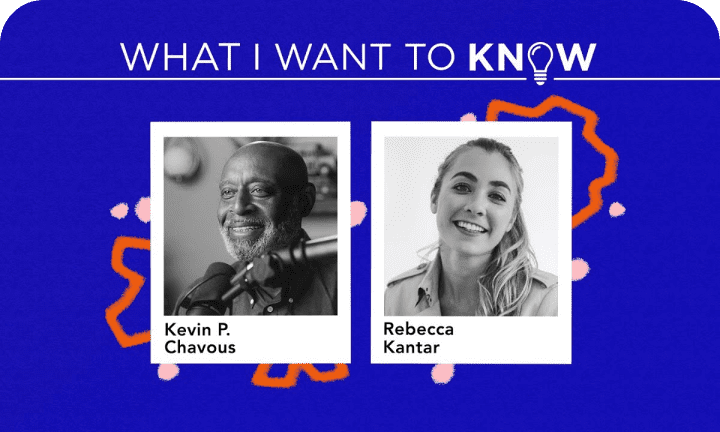April 17, 2024
EP. 150: Should video games be used as tools for learning?
According to the Entertainment Software Association, 76% of kids play video games. With their ability to build problem-solving, communication, and collaboration skills, video games are starting to make their way to the classroom.
What are the benefits of video games? What role should parents have in choosing the games their child plays? And how can video games be used as tools for learning?
In this episode, Stanley Pierre-Louis joins Kevin to discuss how video games can be used as a tool for learning.
Listen on: Apple Podcast, Spotify
Meet Stanley
Stanley Pierre-Louis is the president and CEO of the Entertainment Software Association, an organization dedicated to representing and advocating for the video game industry.
With more than two decades of entertainment and media experience, Stanley leads ESA’s efforts to showcase the video game industry’s impact on business, entertainment, and culture.
Stanley: One of the things about playing games is you can often play from a different perspective. You know, there are games where you can choose your character and you can build that character, and there are some where you’re in a role playing setting. You know, playing as someone else opens you up to someone else’s experience. And a lot of people have found, you know, in studies that it really opens you up to understanding that other experience. So I think there are a lot of these soft skills that people don’t recognize they’re learning by playing games that really excite them when they get there.
Kevin: According to the Entertainment Software Association, 76% of kids play video games. With their ability to build problem-solving, communication, and collaboration skills, video games are starting to make their way to the classroom. What are the benefits of video games? What role should parents have in choosing the games their child plays? And how can video games be used as tools for learning? This is “What I Want to Know.” And today I’m joined by Stanley Pierre-Louis to find out.
Stanley Pierre-Louis is the President and CEO of the Entertainment Software Association, an organization dedicated to being the voice and advocate for the video game industry. With more than two decades of entertainment and media experience, Stanley leads ESA’s efforts to showcase the impact the video game industry has on business, entertainment, and culture. He joins us today to discuss how video games can be used as a tool for learning. Stanley, welcome to the show.
Stanley: Well, thanks for having me. It’s a real privilege to be able to talk to you and to talk to all of your listeners and viewers about the importance of education and how we can play a role in advancing that goal.
Kevin: You have a really, really important job, and I know it can be stressful. You are the CEO of the Entertainment Software Association. So you’re the top voice and advocate for the video game industry. So we’re going to get into a conversation about, you know, what you do and how you do it, and the impact it’s having, not just around the country, but particularly as, you know, my focus is on how it’s having an impact on schools. But before we go there, were you a video games player growing up?
Stanley: Sure. Let me thank you for this opportunity to talk about what we do in each and every day and also what I get to do, which is to do something I was passionate about growing up. You know, I was a child of the ’80s and ’90s and really enjoyed playing games growing up. You know, started off with “Pac-Man” and “Pong” and all those kind of fun games. And as you grow older and try different games and move on in life, you play more, or you don’t play as much, and sometimes you’re going to college.
And then I had the benefit of having a son who got into video games at a young age. And so I got reintroduced to it as a young adult and being able to play with him and see the huge leap in technology in the games that got played, but also the impact of being able to play with others online as opposed to the way we played as solo players or maybe with friends and family in a room. So it’s really changed dramatically, but I’ve gotten to see the growth firsthand.
Kevin: You know, what’s interesting is, you know, I played with all three of my sons, and they were at various ages. So you could track the progress and realism in games based on my sons’ ages because, you know, my introduction was like you, you know, with “Pac-Man” and “Donkey Kong” and all that, with my oldest son. But by the time my youngest son, who’s 23, you know, he had all kind of bells and whistles, and my dexterity wasn’t the same.
And I used to get frustrated. I mean, I would play Madden with my older sons, and at first I would win. And then they got so good. And then by the time my youngest son, you know, started playing, he would play until he beat the game, got to the next level, and I was never there. So there was a bit of frustration on my part. But one thing I wanted to ask you, and I know you’ve done studies on this, why is it so attractive to this generation of young people, the whole video game phenomenon?
Stanley: Well, you know, the most important thing that game companies want to do for whatever the purpose in the game is to make sure it’s entertaining and fun. And so video game companies are listening to what players want and expect and get excited about. Some of that is the technology you see, that photorealism. Part of that is also the conquests. But ultimately, I think what drives interest is a couple of things.
One is that people enjoy playing together. And what we’ve seen really grow over the past decade is the ability to connect with others. And we really felt that during the pandemic, that playing a game is a lot of fun, but playing with friends and family and making new friends via this tool has been exciting. So I think that’s a really important component.
I think also that, you know, video games require a lot of leveling up. You were talking about growing up and playing, and then playing with your kids, who, let’s face it, all of us get outgrown by our kids when we play games with their dexterity. The secret to that, by the way, if you want to know, is to buy an old system and see if they can play on that, which they cannot. You will master the old joystick.
Kevin: Wow. Now that’s a tip I’m going to take.
Stanley: Yeah.
Kevin: That is the one takeaway. I love that.
Stanley: Yeah. They will not beat you on the old joystick. But what you are really describing is a thing that really makes it exciting is that ability to keep playing, fail and try again. It builds that resilience.
Kevin: Yeah.
Stanley: And it’s one of these rare opportunities, whether it’s sports or anything else, where you can lose and still win. And it’s one of those things that people don’t think about that when you’re playing, the point is to win, but you win by trying and not always succeeding. And there are very few things you can do in life where you have failed and yet you’re rewarded in the end for putting the extra effort in and finally winning and getting to the end of the game.
So there is this drive of wanting to beat the game, to get to that next level, that subtly builds this resilience. And I think people enjoy that because it’s a safe zone for trying it. You know, when you lose the basketball tournament, you’re done.
Kevin: Yeah.
Stanley: But with a game, you can still build something and then be excited that you got to that next conquest.
Kevin: Yeah. It’s very interesting. I hadn’t thought of it like that, Stanley, but I do remember when I used to play some of those games with my son, I mean, you would get killed or whatever, you die, but you just tooled back up and worked back up. And I think one of my starkest memories, just came to me, was the Mike Tyson knockout, where, you know, you got to one level, you get to the next one, and then you keep getting there.
And another thing you said that’s interesting, this idea of building a community of fellow gamers, you know, last week my 23-year-old was playing. I heard him, you know, talking, and, you know, no one was in the room. He said, “I’m playing with this kid from Germany,” who’s at a certain level. But that leads me to really ask about some of the challenges.
You know, the first sort of negative connotation associated with video games, it must be about 15, 20 years ago, was violence in games.
Stanley: Right.
Kevin: You know, “Grand Theft Auto” and, you know, the blood and the guts. I mean, talk a little bit about that because some, on the one hand, will argue that that’s contributed to, you know, young people being numb to injury and violence. But on the other hand, it is a game. And what difference is that than a good old-fashioned revenge movie that you see on Netflix or in a movie theater? So talk a little bit about that phenomenon because I do think that, when it comes to video games and young people, that still comes up from time to time in terms of even parental controls and the like.
Stanley: Yeah. I’m glad you raised that because we love actually trying to help people understand and frame where games fit into how we live and how we choose to have fun. First, one of the things that we’ve seen in a number of studies, this came out of . . . there’s an Oxford University study. There is another study out of, I think it’s called “Nature Human Behaviour,” another periodical, where they found that video games are actually beneficial to your mental and social and emotional health. And that’s important because by building community and by reaching that next goal, you actually feel better about what you do.
And for a lot of people, it’s even getting some of the anxiety out by playing games. If you look at the studies we have and others have, it helps people relax. It helps people really channel whatever emotion they may have into this quest together, which leaves them uplifted. So I think there’s a lot of that.
And the other thing that playing together builds is what you described, that companionship, like I have a friend in Germany, so that’s no longer foreign to me, right? That’s just my friend in Germany.
You know, one of the things we like to share with people about the thoughts they have about the impact games may have on lives is the same video games sold in the United States are sold everywhere in the world, and we’re the only ones who seem to have that issue with whether it’s gun violence or behavior that people are concerned about. So what we like to point out to people are the facts that the same games are sold everywhere, and yet other kids in other countries aren’t facing the same issues that we are in the States. So that points us to believe that it’s not the games. It’s other societal issues.
I think the other thing to really get clear for your listeners is that the scientific and academic evidence about games with violent themes are very clear that they don’t cause real-life violent behavior.
Kevin: And that’s an important point.
Stanley: Yeah. And I think that’s critical for them to know. And the final thing I’ll say is one of the things I’m proud of with this industry is when we started ESA, we’re now 30 years old. A like organization was founded on ratings, called the Entertainment Software Rating Board, ESRB. They’re the ones who put the ratings on the games, E for everyone, E10. And they provide information about age appropriateness as well as what’s in the game, a little bit of information of what to expect.
And then the companies with that create parental controls within the games. And so you’re actually able to decide for your own family, I want these kinds of games in or not. I want internet connectivity available or not for my kids to play with others.
So there’s information and there are tools that allow families to decide what kinds of games they want and what they think is appropriate for their families. And so I think if you look at the scientific evidence, if you look at the ability to have awareness and information and resources, but also the real-life example that the same games are sold everywhere, I think that tends to answer the question with some finality.
Kevin: Yeah. And I want to talk more about that and also, you know, sort of this new phenomenon that really led me to want you to be on the show, and that is video games and game-based learning. But before I do, you mentioned the Entertainment Software Association. Talk a little bit about the work you’re doing as the voice for the industry and as an advocate so the listeners have an idea of what your day-to-day is like as it relates to the video game sort of industry.
Stanley: Absolutely. I’m glad we have that opportunity. You know, we have served as the voice and advocate for the U.S. video game industry for the past 30 years. And what that means is that every day we try to promote and protect the dynamic marketplace for games and the workforce who make these games. One of the important things about video games and our industry is that there are people who make games, but there are lots of career opportunities within the industry.
So the number one would be STEM, right? Obviously, if you’re really into STEM, you love coding, or you like thinking about how to problem solve, we’re a great industry. But if you like marketing, we’re a great industry. If you like doing legal work, we’re a great industry. And we like to make sure that people understand that we are a full-fledged industry that really takes into account how we learn, how we share information, and how we come together to provide this really phenomenal experience for players around the world. And those players, by the way, span the entire United States. There are more than 212 million people who play games. And we span every age group. You have just as many, if not more people, 45 and older playing than you do under 18.
And, you know, a few weeks ago I was doing a panel with the AARP. Yes, I just said a AARP. And it’s largely because, you know, their most popular web page on their site is their game site because they found that older people who start playing games keep, you know, mental acuity longer.
Kevin: Yes.
Stanley: And then it also helps them connect. You were talking about your grandchildren. Well, you’re going to have an opportunity to win at Madden again for at least three to four years. So take advantage for the intergenerational play.
Kevin: Yeah. You know, that really is an important point. What are some of the issues that you face? Because, you know, all trade associations have folks who, look, I’m a recovering politician, I know, but there are legislators who oftentimes because of some incident, they’re reactionary, so they’re going to pass a law. And, you know, I’m sure that the video game industry is dealing with an assortment of issues that could impact on the ability of those providers to offer these kind of services to young people, and those who are even older, as you said. So talk about some of those issues.
Stanley: Well, we are a really interesting industry because we combine a lot of arts and sciences all together. So we are an IP industry. You know, we make the games you play. We make the characters. We make the storylines. We code the programs behind it. We also are innovators. We make the devices that you largely play on. We make consoles. You’ve got your switch if you want something portable. And that means that our issues span from anything from intellectual property trade and, you know, patents and copyrights to the innovation issues related to privacy and online matters.
And so we end up really having to think about a lot of issues. And given how people play online more and more, a lot of the leading issues have been on online safety and online privacy and all of those matters. And so we spend a lot of time really thinking about how we best serve our consumer base and how we reflect that to legislators and regulators.
One of the big things, I had mentioned before the work of the ESRB and providing tools and information to parents and families, that’s not always true in every industry. And one of the things, the challenges today is with so much concern about the impact that social media is having on today’s youth, what we have to clarify for folks is that games are different than social media. There are some similar functions of being able to connect with people, but the purpose of playing the games together, you know, isn’t for people to see your profile or your likes, right? It’s really to play together.
And so we have to explain to people that we invest quite a bit into creating an ecosystem where people feel safe and trust that they’re playing with people who are like-minded in the games that they play. So we also invest in a lot of trust and safety tools. Again, very different than some of the social media outlets because the purpose is different.
And then the final thing I’ll say is we monetize our product, not our consumers, which is, again, very different than a lot of how companies operate. And so, for us, it’s all about creating value in the game and connecting people to play as opposed to, you know, selling information about the players.
Kevin: Yeah. And that is an important point in addition to the fact that, just based on what you said, it seems that you are engaged in a lot of education about what the video game industry really is because there are misnomers and because of some of these challenges out here, it’s easy for folks to blur the lines if they don’t know what they don’t know. And so that’s an important service.
Let’s talk about education and video games. At our company, Stride, we have heavily invested in game-based learning. We have found and our data shows that particularly for a number of kids who are the typical unengaged student, this is a great engagement tool for the reasons that you alluded to earlier. Give you an example. You know, a couple of years back, when I first started to become aware of game-based learning, I had no idea how big eSports was. It’s bigger than Major League Baseball, National Football League, National Basketball Association, National Hockey League combined.
And you can go to a stadium where there are 100,000 people and 10 kids are on the, you know, Megatron screen playing video games. I was candidly blown away. And then, you know, we use “Minecraft” as a huge tool and work with some of the, you know, organizers, and founders to develop game-based learning with goals toward helping kids with their reading and writing and math computation and all that.
So it’s clear that there are benefits, but still we have found that some parents are slow to come around. They’re fearful. And there’s some of that, because of all this going on, as you alluded to with social media, there’s still some fear-based thinking around video games and education.
And the last thing I’ll say on this, some of the education purists, they have issues with merging those lines. I feel we’re headed that way. And the data that I’ve seen shows there are some benefits, particularly for kids who are otherwise unengaged or hard to get engaged in learning. So talk a little bit about that relationship and what you have seen both from an evidentiary point of view and just anecdotal point of view.
Stanley: Sure, sure. And you raised a lot of good points. You know, one of the things you had mentioned before were what I would say is some of the soft skills that we mentioned, some of them about resilience and the like. I think one of the other areas, before I get to some of the specific education examples, the role that games play in building empathy is sometimes overlooked.
One of the things about playing games is you can often play from a different perspective. You know, there are games where you can choose your character and you can build that character, and there are some where you’re in a role playing setting. You know, playing as someone else opens you up to someone else’s experience. And a lot of people have found, you know, in studies that it really opens you up to understanding that other experience. So I think there are a lot of these soft skills that people don’t recognize they’re learning by playing games that really excite them when they get there. So I think that can’t be overlooked.
Kevin: Yeah.
Stanley: You mentioned “Minecraft,” and one of the really interesting and compelling things about “Minecraft” is that they’ve opened up that platform for their education edition for some of the things you had talked about because they found that once you get someone who’s really interested in their game to learn more, they just devour it because that gamification makes life fun.
And it’s kind of like, even when you’re a kid and you’re trying to memorize things, like if you were just trying to rotely memorize, it’s different than when you’re playing that game with flash cards and you’re trying to pair things, right? That gamification is just at a higher level through gameplay.
And so through Microsoft, they offer courses that use their platform for STEM, for coding, for history, for math, for language arts. So they’re able to accommodate lots of different needs and grow that community in that educational way. I will also say that the Minecraft team worked with a group called Games for Change and the Nobel Foundation to create a learning environment around Nobel Laureates. And some of them have long passed, and some like Malala are still around. And so they’ve created an online museum building a Minecraft version of their award ceremony and of the things that people did to teach. So it’s being used in a very international way.
Another one of our companies is called Ubisoft, and they make a variety of amazing games that take you back in time. And one of the things they’ve done is made some of those games more educational in nature. They have a game called “Discovery Tour,” and rather than, you know, fighting your way through some era or a war, you’re really going through, you know, ancient Greece, ancient Egypt, the Viking age to understand what was going on. And they do things at a very high level in terms of research and have pointed things out in historical artifacts that historians have gone back and said, “Wow, that is really interesting. And I think that’s actually right.”
Kevin: Wow.
Stanley: And one of the things they did, they had the most pristine and voluminous number of photographs of Notre Dame so that when it burned, they gifted to France high-level, high-tech photos, so that when they’re rebuilding, they get it just right because they needed all those photorealistic images for the games that they build around Paris, right? So you’re seeing it’s educational and reconstructive.
I think one of the other ones that people may not know about, but they should, is called iCivics. And iCivics is today the largest provider of civics education in the country. It’s a free game that teaches you about democracy and how to build one. And it was a gift to the nation by former Supreme Court Justice Sandra Day O’Connor, who wanted to leave a legacy of citizenship. Rather than a statue or a library, she felt like people should understand how to speak across party lines, generational lines. And so kids are learning about civics through a video game and really taking it by storm. And so I think that’s exciting.
The last thing I’ll mention is you talked about eSports, and we’ve seen over the past 20 years a huge explosion of people playing games. And for those who don’t know what eSports is, eSports is competitive video gameplay, and there are certain games that are really famous for it. People who know how to play the game and love watching the game are blown away by the mastery of people who compete in this. And it’s become a massive billion-dollar ecosystem. There are professional sports teams now playing it. You actually have an older team I think in Germany of 65 plus years old players who compete as well.
But there are also scholastic eSports teams in the K through 12 level as well as in college. And they teach you about coding and building games, but also about what it means to be in sports, what it means to be team building and problem-solving together. You know, it’s an opportunity to extend something people love to do, but in a setting that’s very modern.
Kevin: You know, what’s fascinating about eSports, it reminds me of the way people used to view chess matches and, you know, the Grandmasters in chess, you know, Spassky and Bobby Fischer.
Stanley: Bobby Fischer, sure. Yeah.
Kevin: Bobby Fischer. And so the whole thing is definitely going to the next level. Stanley, I have a couple of more questions. But before I forget, how do you see the emergence of AI having an impact on the video game industry and usage going forward?
Stanley: That’s a great question. What we are hearing the most from companies is that AI is a great technology that will enhance human innovation, not replace it. And what that means is within the work that you do, you’re writing lines of code, we already have some technology that can help you auto-fill some of the background code you need for, you know, a scene you’re building. And a lot of it is the drudgery of line by line editing on, you know, how I want this scene to look.
So, you know, what we’re hearing is that’s one way you can use it to do that level of work so that your human innovation is working at the higher level. So that’s one way.
I think there are a lot of challenges to figuring out how exactly you make sure that AI is being used in a way that doesn’t disrupt the gameplay the way that people like it. And so I think the jury is still out on exactly how it’s going to be used. But we know that with every technology, there’s an opportunity to enhance gameplay, enhance the technology of how games are made, and to really enhance the player experience. And so I think you’re going to see it in all three phases, but how it will be used is still yet to be determined.
Kevin: Well, yeah. And, you know, buckle up because I think that it’s going to impact things significantly, but I don’t have the fear-based thinking around it that some people do. I think that, by and large, it is going to be a good thing for the industry.
Stanley: Another thing on AI, just so I can say it, you know, the AI that we are all talking about today, this generative AI has really exploded since the launch of ChatGPT in December of 2022.
Kevin: Yes.
Stanley: AI has been around for some time, including in video games for the past 20 plus years. When people play games, they’re sometimes moving around with what we call non-playable characters, NPC. And so as you’re engaged in a lot of gameplay, you probably have interacted with AI in some way, shape, or form without knowing it. But it’s because it doesn’t disrupt the play.
The other thing is that AI has been used to try to help on the trust and safety side within the gaming ecosystem because with the explosion of games, you can only have so many human moderators. And so if AI can help identify scenarios in which something needs to be addressed, you try to see if you can engage with that technology. So AI has been a part of the system. It’s just this new generative AI has caused the conversation to shift a little bit about game creation and some of the larger issues you’ve seen in the world.
Kevin: No, that’s a great point. And particularly in the education space, with ChatGPT, I mean, it really put a different light on the whole notion of AI, even though, as you said, it’s been here in some form or fashion for many years.
So, Stanley, this is the last question. This is what I really want to know. What advice would you give school leaders on how to incorporate video games or engage in game-based learning, particularly as it relates to their curriculum or classroom lesson plans? Now I realize you’re not an educator by nature, but you are an expert in this area. And what advice would you give school leaders who want to go in, but they’re not sure?
Stanley: You know, I think one of the things that I’ve seen from educators is they want to prepare their students for the world, right? Like you need to learn some standard things, but you also want to prepare students to be able to confront challenges that may come about. And I think games are a great way to address that, right? And so there are appropriate games for different contexts that are worth looking into and using and not being afraid of it, particularly given the fact that kids are going to be playing games, they’re going to be online. And so creating that environment helps them think about future challenges.
I think the other thing on a broader scale is learning digital safety habits in school is critically important for kids because you’re learning in an environment with trusted sources, teachers and administrators who want to make sure that you’re good digital citizens. And so games are a great way of engaging on that front to understand more broadly what’s appropriate behavior online and what do you report out, but also what’s a fun way to learn and how do I use this in a way . . . You mentioned ChatGPT. A lot of schools have these rules now, you can’t use any AI for your research, but I’ve seen some others saying I don’t want you to use it for your paper, but I want you to test it out and tell me what you’re seeing and let’s engage to see what it’s working like and what we can gain from it and what are the limitations.
And so I think the more educators can engage with new technologies to provide information about how to engage with it in the real world, the better the students are going to be in the long run.
Kevin: Yeah. And I also think, it just hit me as you were talking, that whole idea of utilizing iCivics could be a huge value add for a lot of educators, particularly since civics has become less and less of a priority in some school districts.
Stanley: Yeah. It’s a free tool. And they update it with world events. And so anytime you see a major world event, they think of a game that will engage students to try to work collaboratively to solve.
Kevin: Yeah. Well, this is all good stuff, and I’m all in. I mean, even though I’m an old head, I believe that this is the wave of the future. And so Stanley Pierre-Louis, thank you so much for joining us today on “What I Want to Know.”
Stanley: Thanks for this opportunity, and thank you for the great work that you’re doing.
Kevin: Thank you. Thanks for listening to “What I Want to Know.” Be sure to follow and subscribe to the show on Apple Podcasts, Spotify, or your favorite podcast app so you can explore other episodes and dive into our discussions on the future of education. And write a review of the show. I also encourage you to join the conversation and let me know what you want to know using #WIWTK on social media. That’s #WIWTK.
For more information on Stride and online education, visit stridelearning.com. I’m your host, Kevin P. Chavous. Thank you for joining “What I Want to Know.”
About the Show
Education is undergoing a dramatic shift, creating an opportunity to transform how we serve learners of all ages. Kevin P. Chavous turns to innovators across education, workforce development, and more to ask: “How can we do better?”
Related Podcasts
Listen to more podcasts about this topic.
Featured Resources
Discover more resources that address the topics impacting students, families, and educators today.





















